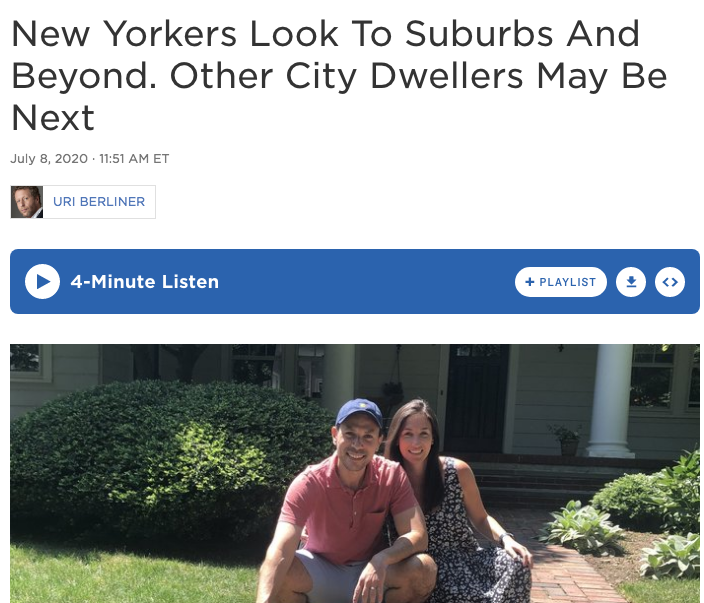What City Observatory did this week
CityBeat: NPR urban flight story. The pack animals of the media have settled on a single, oft-repeated narrative about cities and Covid-19; that fear of the virus will lead people to move to the suburbs. The latest iteration of this trope is an NPR story, focused on a couple moving from New York City’s Upper West Side to suburban Montclair, New Jersey. There are several problems with the story (starting with the fact that the couple was already planning to move prior to the pandemic). More importantly, the risk of contracting the virus is about one-third greater in the suburb they’ve chosen than in Manhattan. More broadly, the data don’t bear out this claim: well-educated young adults are moving to cities in increasing numbers, and real estate search data from the height of the pandemic show no decline (and even a slight increase) in interest in urban locations.
Must read
1. Stop more building roads. In an Op-Ed published by The New York Times, engineering professors Shoshanna Saxe and
Most developed countries already have effective road systems; they can be maintained, but the economic benefits of expansion are marginal and the downsides significant. Road construction is environmentally destructive, and it promotes urban sprawl, congestion, air pollution and inequality.
The Hippocratic oath requires that physicians “First, do no harm.” It’s advice that ought to apply with equal, if not greater force to engineers. Our transportation system, and the sprawl and climate crisis it has spawned, are the product of spending too much on transportation, not too little.
2. And take the cars off the streets of Manhattan. Farhad Manjoo has a long-form on-line essay (with singing and dancing graphics) in The New York Times, arguing that now is the time to ban privately owned cars from Manhattan. The pandemic has given city dwellers everywhere a better sense of what life would be like with fewer cars, and how we might better use our scarce public road space to serve a wider variety of uses (an users). Manjoo makes a detailed and comprehensive case for the safety, environmental and livability benefits of greatly reducing the number of cars on the island. Drawing on the work of a number of urbanists, Manjoo sketches out what life might be like with fewer cars in New York City:
Underscoring all of the reasons for a ban is simple equity. Most people in New York don’t own cars, and don’t use them to travel to work or other destinations; its simply unfair to prioritize the needs of a generally wealthier few over the many especially when cars degrade everyone’s quality of life. To quote Manjoo:
The amount of space devoted to cars in Manhattan is not just wasteful, but, in a deeper sense, unfair to the millions of New Yorkers who have no need for cars. More than half of the city’s households do not own a car, and of those who do, most do not use them for commuting. . . . New York’s drivers are essentially being given enormous tracts of land for their own pleasure and convenience.
Streets ought to give priority to the people who live in the city, and who want to be there, rather than those who simply want to travel through it (or use the public realm for free storage of their personal vehicles. No city is better position to lead the way in this revolution than New York.

